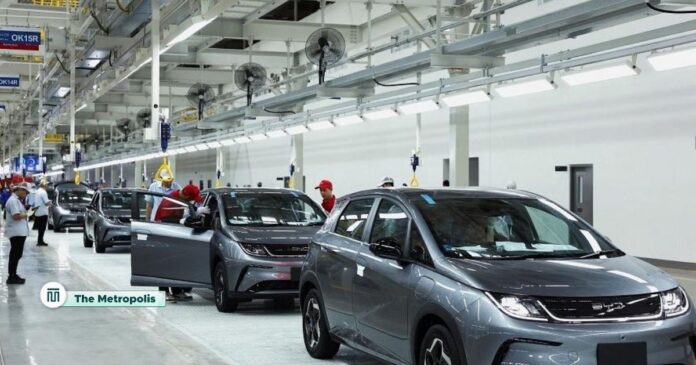Due to national security concerns, the US Commerce Department is anticipated to propose on Monday banning Chinese hardware and software from connected and autonomous vehicles driven on US roads, two sources told Reuters.
The Biden administration is extremely concerned about Chinese companies gathering data on US drivers and infrastructure, as well as the possibility of foreign manipulation of internet-connected vehicles and navigation systems.
The two people, who wished to remain anonymous because the decision had not been made public, claimed that the proposed regulation would prohibit the import and sale of automobiles from China that have hardware or software related to automated driving systems or critical communications.
The action represents a major increase in the ongoing restrictions imposed by the US on Chinese autos, software, and parts. Last week, the Biden administration imposed significant tariff increases on Chinese imports, including new increases on EV batteries and essential minerals in addition to a 100% duty on electric cars.
Gina Raimondo, the secretary of commerce, stated in May that there were serious risks associated with Chinese hardware or software in connected US cars.
“Theoretically, if there were a couple million cars on the road and the software malfunctioned, you could imagine the most catastrophic outcome.”
The Biden administration raises national security concerns about Chinese companies’ data collection practices.
The proposed ban includes hardware or software for key communications and automated driving systems.
30 days for the public to provide feedback before the rules are finalized
President Joe Biden issued an executive order in February to investigate whether Chinese connected car technology poses a threat to national security and whether it should be illegal to install such hardware and software in any vehicle on US roads.
“China’s policies could flood our market with its vehicles, posing risks to our national security,” Biden had stated earlier. “I’m not going to let that happen on my watch.”
According to the sources, the Commerce Department intends to allow the public to comment for 30 days prior to finalising the regulations. Nearly every more recent vehicle in the US is considered “connected.” These cars can share data with devices inside and outside the car thanks to onboard network hardware that permits internet access.
Additionally, the department intends to suggest that the hardware ban begin in January 2029 or the 2030 model year, while the software ban would go into effect in the 2027 model year. The cars in question would be prohibited from having certain wireless, satellite, and Bluetooth features, as well as highly autonomous cars that could function without a driver.
In November, a group of US lawmakers from both parties expressed concern about Chinese tech and auto companies gathering and using private information while conducting trials for driverless cars in the US.
According to the sources, the bans would also apply to other foreign enemies of the US, such as Russia.
It would take time to replace hardware and software, according to a trade association that represents several large automakers, including General Motors, Toyota Motor, Volkswagen, Hyundai 005380.KS, and others.
The automakers stated that their systems “undergo extensive pre-production engineering, testing, and validation processes and, in general, cannot be easily swapped with systems or components from a different supplier.”
On Saturday, the Commerce Department declined to comment. Reuters first revealed details of a plan in early August that would prevent Chinese automakers from testing autonomous vehicles on US roads. Imported light-duty vehicles from China are comparatively rare in the US market.
A government website states that the White House approved the final proposal on Thursday. The goal of the regulation is to protect the US connected vehicle supply chain. The sources stated that while it will cover all vehicles on US roads, it will not cover cars used in mining or agriculture.
As Biden pointed out, the majority of cars are networked devices, much like smartphones, that are connected to vital infrastructure, phones, navigation systems, and manufacturers.
Create an account
Welcome! Register for an account
A password will be e-mailed to you.
Password recovery
Recover your password
A password will be e-mailed to you.
14.4
C
New York
Monday, June 2, 2025
SourceAFP
The Metropolis is an online podium for journalism, presenting stories behind stories. The new breed of digital newspaper taps into possibilities and reflects on solutions. The boom of digital journalism has made shareable items sprout and bitesize contents mushroom. But, the depth and dimension gap is still wide open. That’s where The Metropolis, a news and content portal, makes a difference, delivering facts to inform, inspire, and include.
Contact us: themetropolisreport@gmail.com
© Copyright - The Metropolis by Reactron Global



